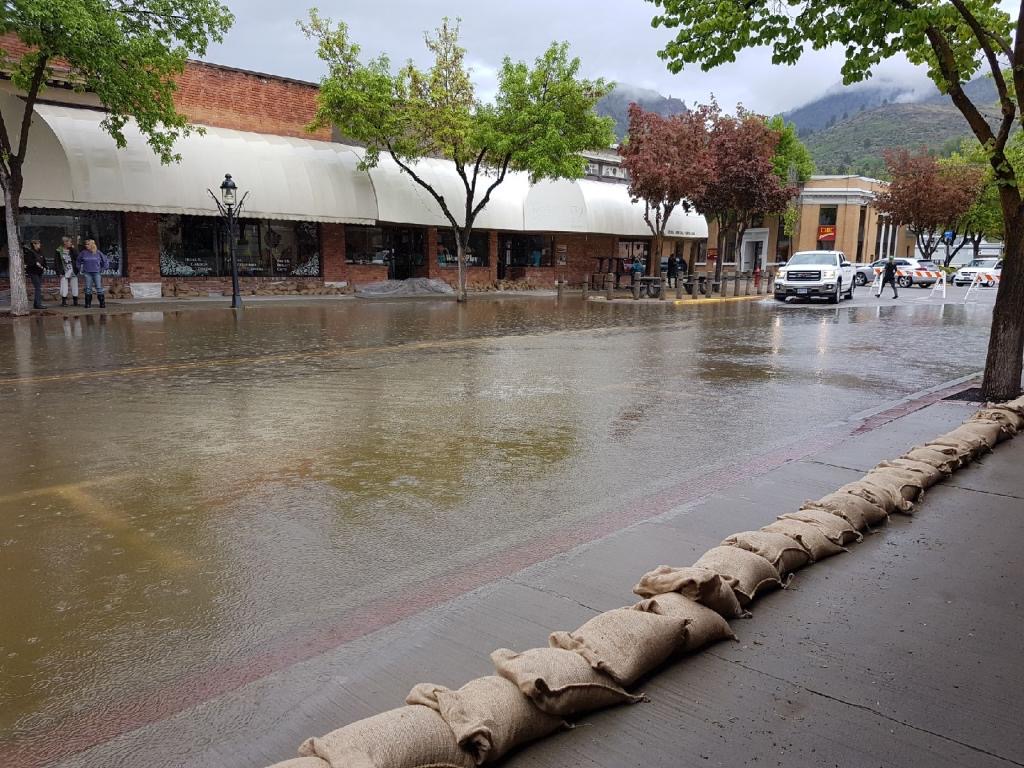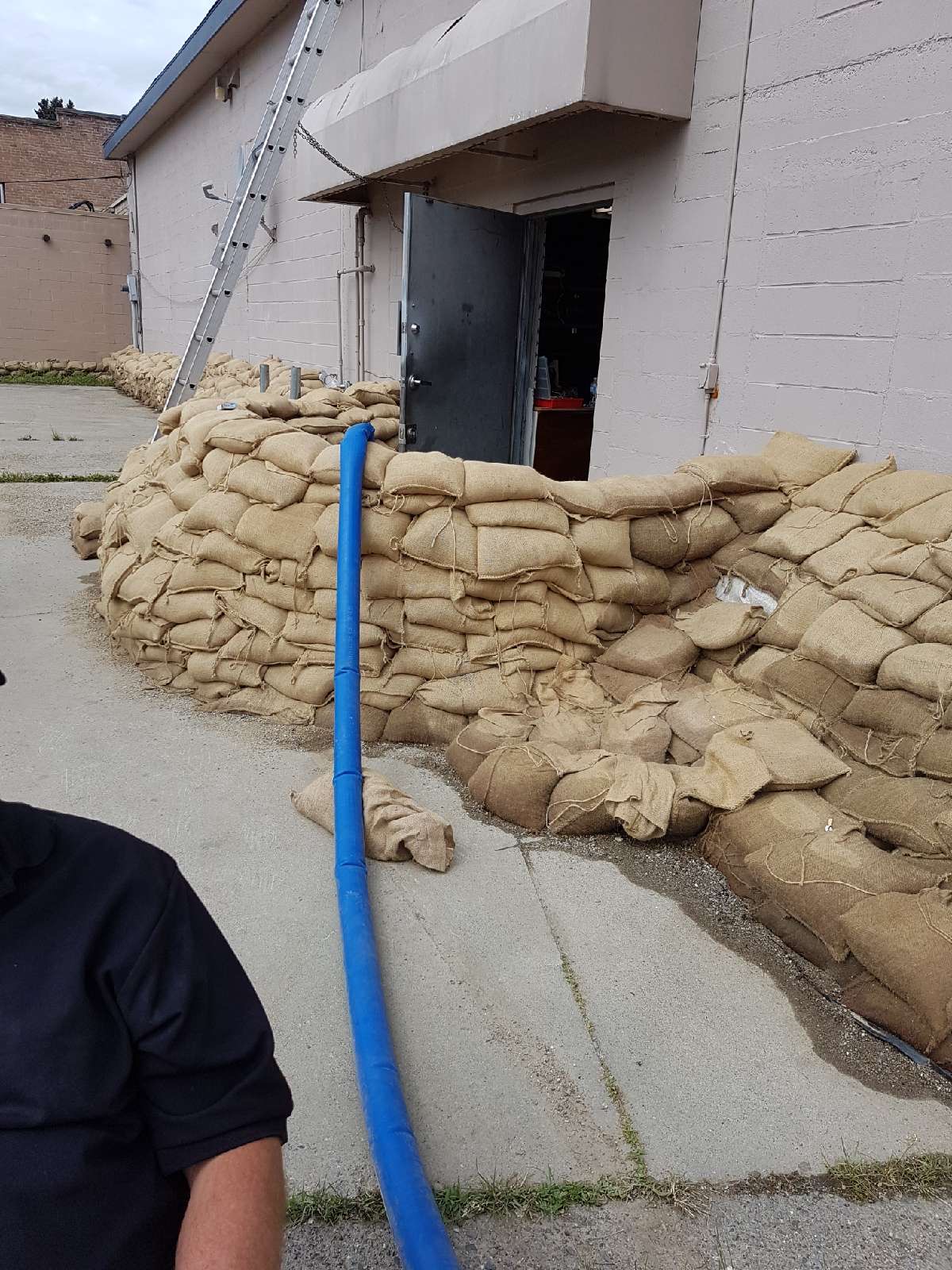This is Part Three of a four-part series called Grand Forks: Cost of Disaster. The next article will be published on Thursday.

Beleaguered Grand Forks, B.C., business owner John Zibin is still fighting his insurance company for compensation, 19 months after the devastating floods of spring 2018.
Zibin has owned the building at the corner of Third Street and Market Avenue for 20 years and also owns The Source, one of three businesses within the building. Two of the businesses are still closed.
After the floodwaters receded and remediation work began, Zibin said he was initially approved by his insurance company for sewer backup coverage.
It was determined that the damage was caused due to the failure of the city’s sewer system.
“Low and behold the insurance company sent a couple of adjusters and team members and let us know that it’s not sewer backup, it’s overland, so therefore everything stopped,” he told Global News.
That meant the $50,000 deductible kicked in for overland flood insurance, which is much more than the $2,500 deductible for sewer backup coverage.
“We were just shocked because other businesses with the same policy, the same insurance, the same deductibles, the same flood get everything remediated no questions asked, and here were are, ‘no, no, no, fend for yourself,’” he said.
Zibin said he turned to his savings account to fund the repairs and is filing claims hoping for reimbursements from his insurance company.
WATCH: In an extended interview, John Zibin explains the ongoing battle with his insurance company.

“No rental income, lost my tenants, money out of my own pocket, and I still don’t have an answer as to what’s going on. Delay after delay after delay. We’re 19 months, we’re almost two years,” he said.
And he’s not alone. The floods had a major economic impact on the city.

Get breaking National news
According to an economic assessment report completed by the British Columbia Economic Development Association, the total economic loss in Grand Forks was at least $38 million.
The economic development specialists surveyed 125 businesses in August 2018, four months after the floods, and found 188 employees were laid off, resulting in $2.4 million in lost wages.
While some businesses managed to get back on their feet, the Downtown Grand Forks Business Association said a recent survey revealed 30 storefronts are still vacant.
Jennifer Wetmore, the former head of the Boundary economic recovery team, said some businesses didn’t have, or weren’t eligible for, flood insurance.
Those who had it faced major obstacles due to the complicated claims process and delays in assessments.

“Being able to negotiate with some of the adjusters to settle on some of the bigger ticket items was a real challenge,” she said.
Wetmore encourages business owners to go over their insurance policies with a fine-tooth comb and be prepared for business interruption caused by a natural disaster.
“Understanding the risks of not being able to get back in business for an extended period of time, so whether it’s having a co-location that you can pop up and do some business in for a period of time, all of those things are things that we need to start thinking about if we want to be able to sustain an event of this magnitude,” she said.
Wetmore said the fallout in Grand Forks should be a wake-up call for the province as major flood events become more frequent and destructive.
The economic recovery team assembled in the wake of the flood recommended greater provincial oversight of flood insurance practices, to ensure fair and equitable compensation.
“I know that our story is not unique, we’ve seen similar stories in High River, I think it’s a good role for the province to consider taking on,” Wetmore said.
Wetmore said they presented a few of the questionable insurance cases to FICOM, the industry’s regulating agency, and it responded that the practices were in line with government legislation.
The City of Grand Forks tabled a motion at the Union of B.C. Municipalities Convention in fall 2018, calling on the province to play a more proactive role in the way overland flood insurance is dealt with in the province. The motion was endorsed by other municipalities.
Mike Farnworth, B.C.’s minister of public safety, said the insurance woes are part of a review and rewrite of B.C.’s emergency management legislation currently underway.
“We expect that people who have signed policies in good faith are treated fairly by the industry,” Farnworth told Global News.
“This is one of those areas where during not only the consultation period but also in terms of the public policy period where we can look at how people are being treated and are there issues that need to be dealt with either at a provincial level or a federal level,” he said.
As for Grand Forks, there are renewed efforts to revitalize the downtown core. Wetmore said the business community has been resilient in the face of disaster.
“They’ve done a huge amount of incredible work to get back on their feet,” she said.










Comments